From jobs to broadband to climate change, House passes omnibus that covers a lot of ground
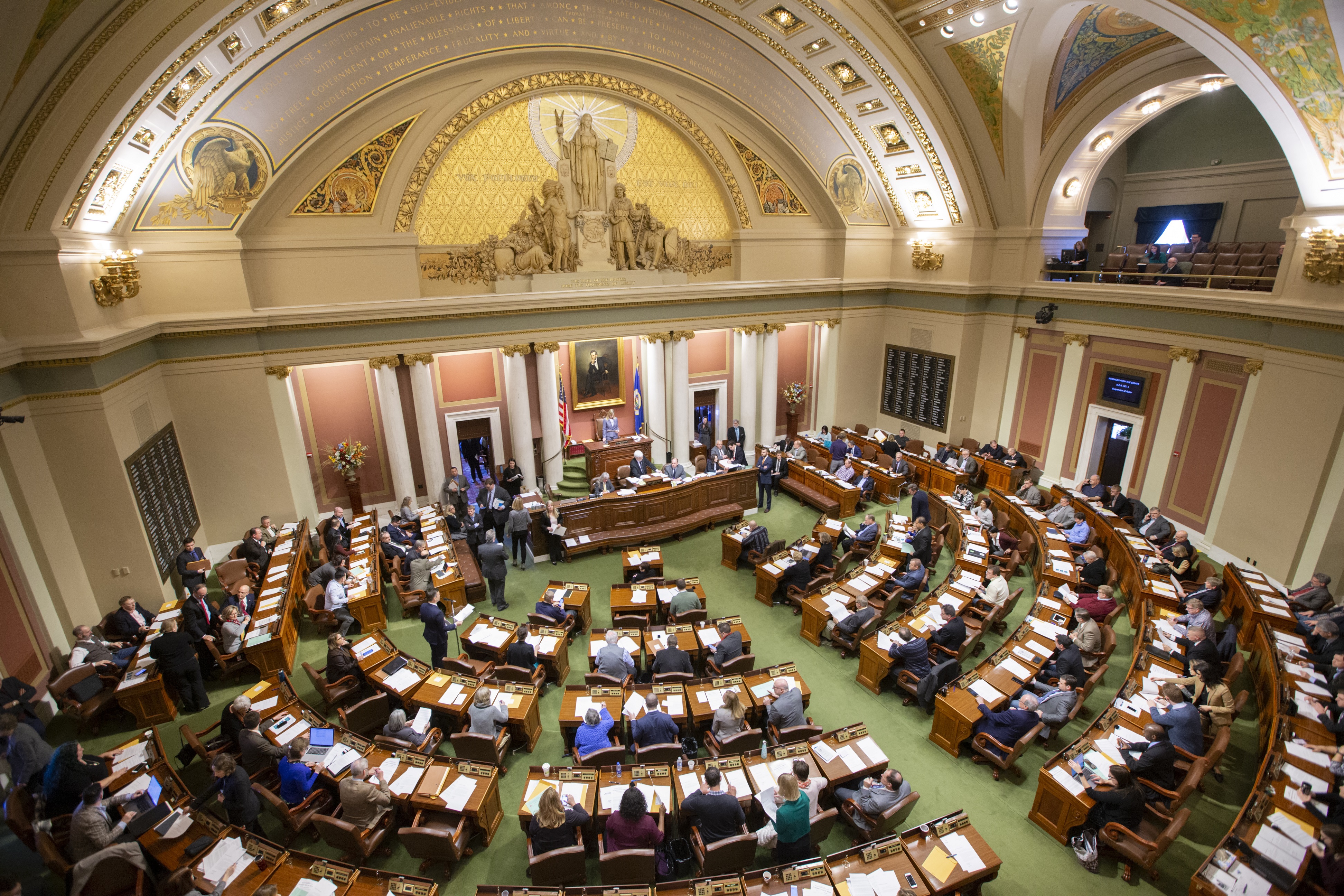
After a late night Tuesday and a long day of arguing on Wednesday, the House finally passed its omnibus jobs and economic development, energy and climate, and telecommunications policy and finance bill.
As amended, HF2208, sponsored by Rep. Tim Mahoney (DFL-St. Paul), received a favorable 74-59 vote. It now heads to the Senate, where it is sponsored by Sen. Eric Pratt (R-Prior Lake).
The bill combines the work of a few different House divisions, including the House Jobs and Economic Development Finance Division, the House Energy and Climate Finance and Policy Division, and the House Greater Minnesota Jobs and Economic Development Finance Division.
It also includes three of what House DFL members identified as their 10 biggest priorities for the 2019 Legislative session: mandating a statewide paid family and medical leave policy, creating laws that prevent and punish wage theft, and expanding broadband in rural areas.
The paid family medical leave program is expected to cost $31.99 million over the 2020-21 biennium, with an additional $533,000 for outreach, education, and technical assistance for employees and employers.
[MORE: Watch Part I, Part II, Part III of Wednesday's debate]
An amendment successfully offered by Mahoney would provide “a little more flexibility” for businesses that provide private leave options and make other technical fixes, he said.
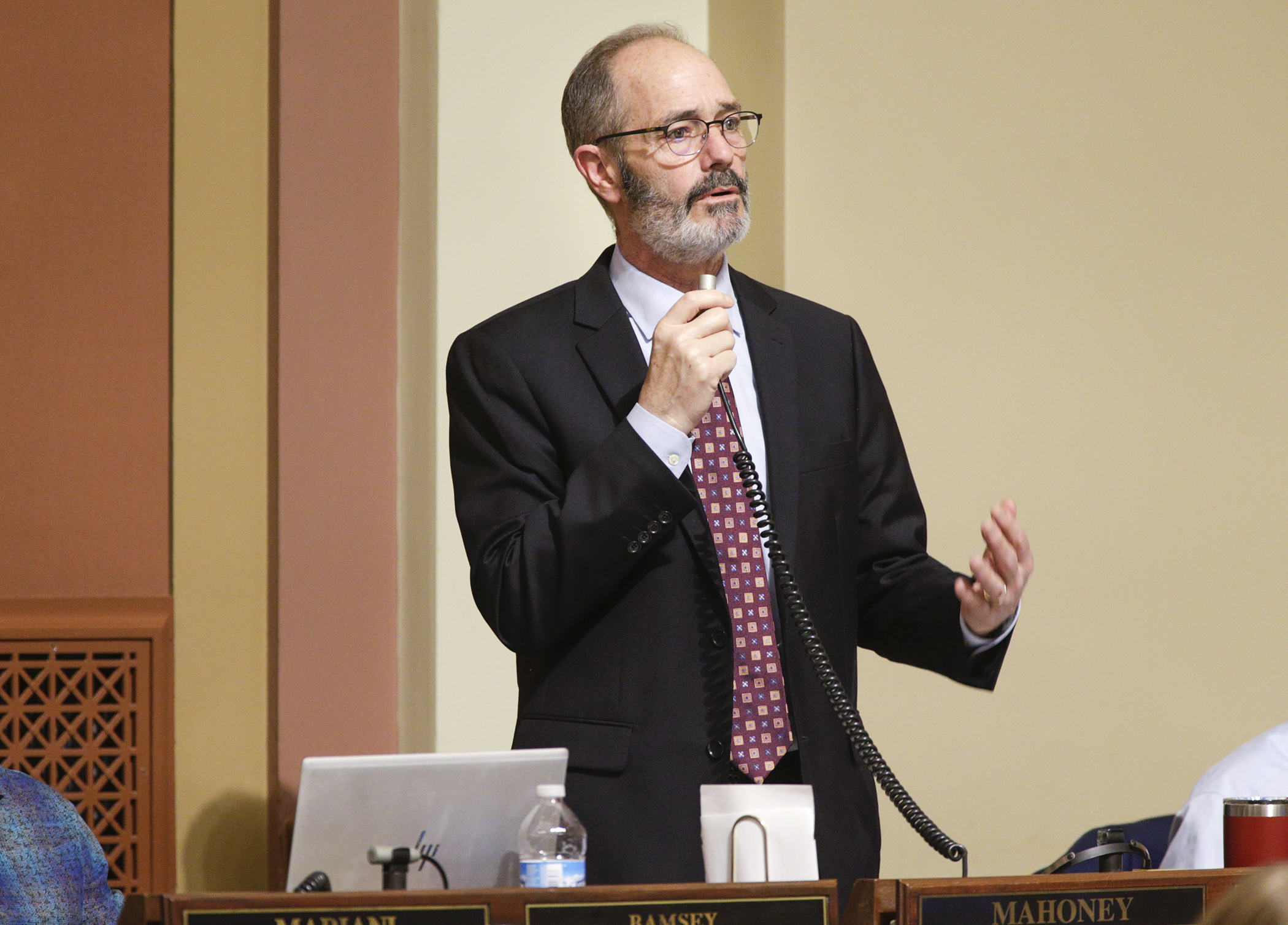 Rep. Tim Mahoney, chair of the House Jobs and Economic Development Finance Division, explains provisions of HF2208, the omnibus jobs and economic development bill, during floor debate April 23. Photo by Paul Battaglia
Rep. Tim Mahoney, chair of the House Jobs and Economic Development Finance Division, explains provisions of HF2208, the omnibus jobs and economic development bill, during floor debate April 23. Photo by Paul BattagliaRep. Barb Haley (R-Red Wing) unsuccessfully offered an amendment to the amendment that would have made it even easier for businesses to get private plans approved. Business owners warned her the proposed legislation, in its current form, could have “unintended consequences” and compel them to cut other benefits, she said.
Rep. Laurie Halverson (DFL-Eagan), who sponsors HF5, said Haley’s addition was “unnecessary,” as sufficient flexibility for employers had already been built into the program “so that they can offer a private plan that works for them and their employees.”
Republicans also expressed reservations regarding the bill’s sick and safe time provision – as originally outlined in HF11 by Rep. John Lesch (DFL-St. Paul) – citing the potential financial strain that it could inflict on small businesses.
Some of the amendments that provoked the most extended and contentious debate would have eliminated the bill’s language promoting net neutrality and placed restrictions around the development of software for the paid family and medical leave program, all of which were either defeated or deemed not germane to the bill. Another defeated amendment would have allowed 16- and 17-year-olds to professionally use riding lawnmowers, trimmers and weed cutters.
Rep. Bob Gunther (R-Fairmont) and House Minority Leader Kurt Daudt (R-Crown) offered amendments focused on improving reporting and increasing the oversight of grant programs, which received bipartisan support and were approved. While supportive of the initiatives, Mahoney said that he remains concerned about the House’s ability to secure the additional funding needed to support them.
Other notable finance provisions in the bill would provide:
- $75.88 million for vocational rehabilitation services, an $8 million increase over the biennium;
- $70 million to fund the Border to Border Broadband Development Grant Program;
- $12.29 million to fund the Pathways to Prosperity adult workforce competitive grant program;
- $10 million in need-based relief grants for dairy producers, to be awarded through the Department of Agriculture;
- $2.87 million to support the establishment of child care businesses through WomenVenture, Minnesota Initiative Foundations, and Child Care Economic Development Grants;
- $2 million to each of the following: Youthprise, Ujamaa Place, Latino Communities United in Service, and the Hmong American Partnership;
- $1.5 million to provide support services competitive grant funding; and
- $1.31 million to support the enforcement of wage theft prevention measures in the bill.
Many programs funded in the bill focus on workforce development initiatives in Greater Minnesota, or are required to use a portion of their funding to serve communities outside the metro area.
Energy would become increasingly renewable under bill
Policies that mandate the use of energy from solar, wind, hydroelectric and biomass sources are a central part of the section devoted to energy and climate. It closely mirrors those in HF1833, the omnibus bill approved by the House Energy and Climate Finance and Policy Division.
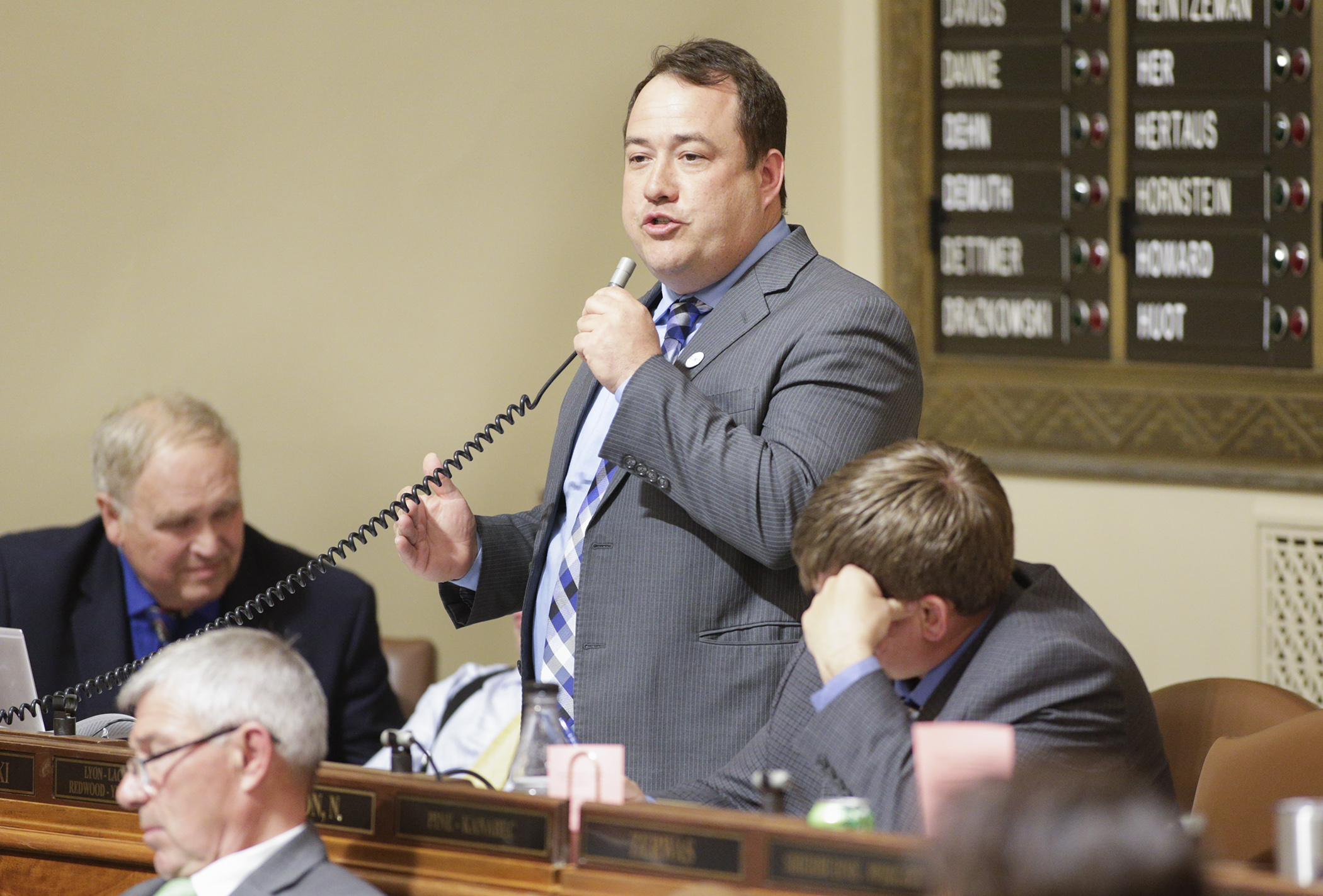 Rep. Chris Swedzinski offers one of a series of amendments to HF2208, the omnibus jobs and economic development bill, during Tuesday’s late-night floor debate. Photo by Paul Battaglia
Rep. Chris Swedzinski offers one of a series of amendments to HF2208, the omnibus jobs and economic development bill, during Tuesday’s late-night floor debate. Photo by Paul BattagliaBut there would be significant increases in appropriations for some programs. For example, funding for a rebate program for purchasers of electric vehicles would increase by about 50 percent to $10.4 million. The amount allocated to the Metropolitan Council for the purchase of electric buses in Fiscal Year 2019 would increase by 60 percent to $8 million.
The bill would promote the increased use of electricity – including as a heat source and in transportation – to reduce greenhouse gas emissions.
Much of the energy debate centered upon community solar gardens, with eight amendments defeated, including one that would place sunset provisions on both the program and a grant program to help low-income households participate.
Amendments that were approved were mostly technical clarifications, but one puts the Legislature on record as finding “that greenhouse gas emissions resulting from human activities are a key cause of climate change.”
Among other energy-related appropriations for the next biennium would be:
- $56.8 million for the Petroleum Tank Release Cleanup Fund;
- $16 million for the “Solar on Schools” program, assisting school districts in converting to solar energy;
- $8.9 million for the Made in Minnesota Solar Incentive Program;
- $6 million each to the University of Minnesota and Minnesota State for their transitions to renewable energy sources;
- $5 million to expand and extend Xcel Energy’s Solar Rewards program;
- $5 million for the Prairie Island Indian Community to move toward becoming a “net zero energy” user;
- $3.5 million for installation of solar devices in state parks; and
- $2.5 million for a revolving loan fund for electric vehicle charging stations.
Session Daily Writer Rob Hubbard contributed to this story.
Related Articles
Search Session Daily
Advanced Search OptionsPriority Dailies
Full House convenes for first time in 2025, elects Demuth speaker
By Tim Walker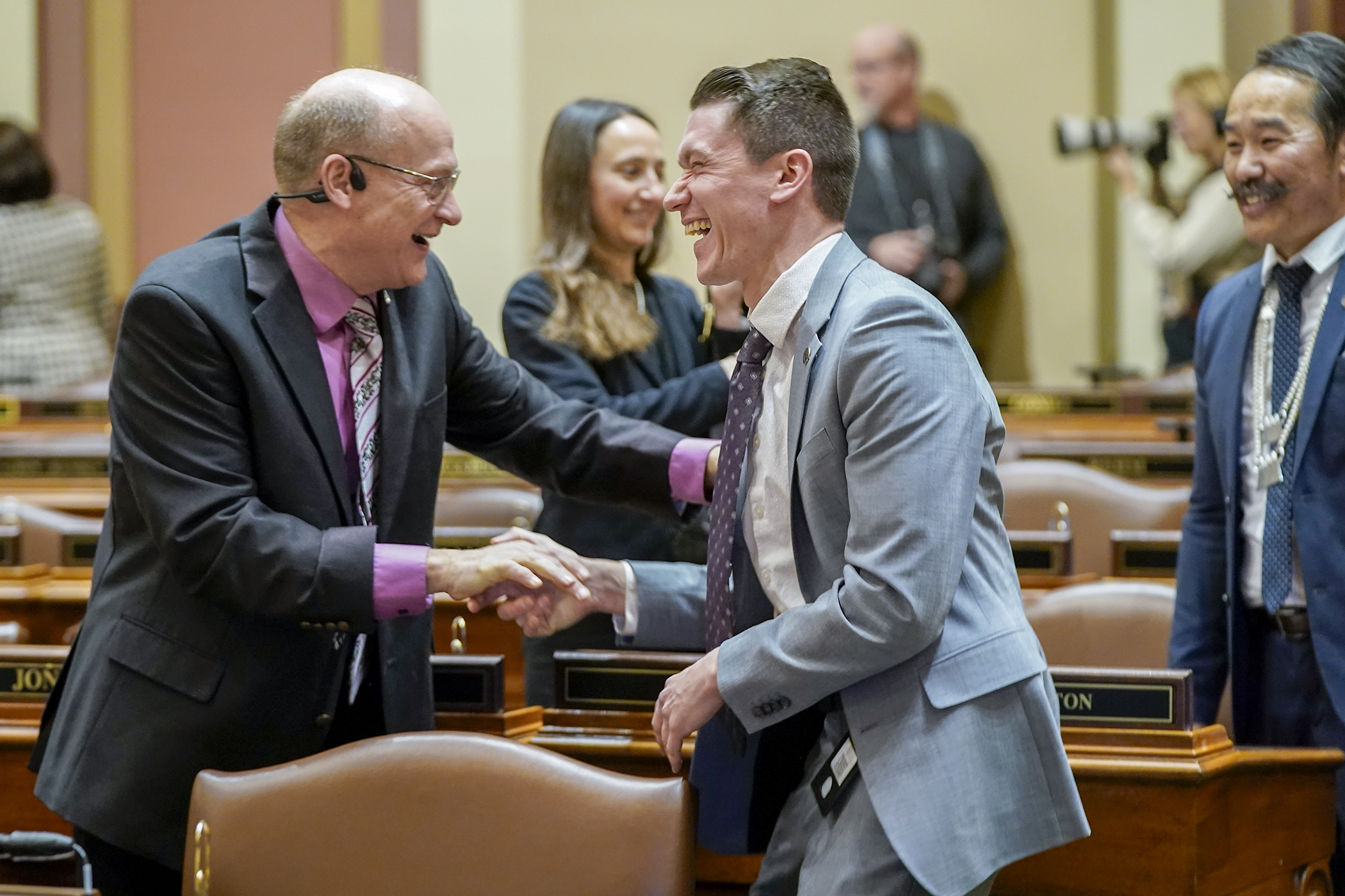 DFL, Republicans convene with a quorum for the first time in 2025 session after agreeing to a power-sharing deal.
DFL, Republicans convene with a quorum for the first time in 2025 session after agreeing to a power-sharing deal.
Walz proposes slimmed-down 2026-27 state budget, sales tax changes
By Tim Walker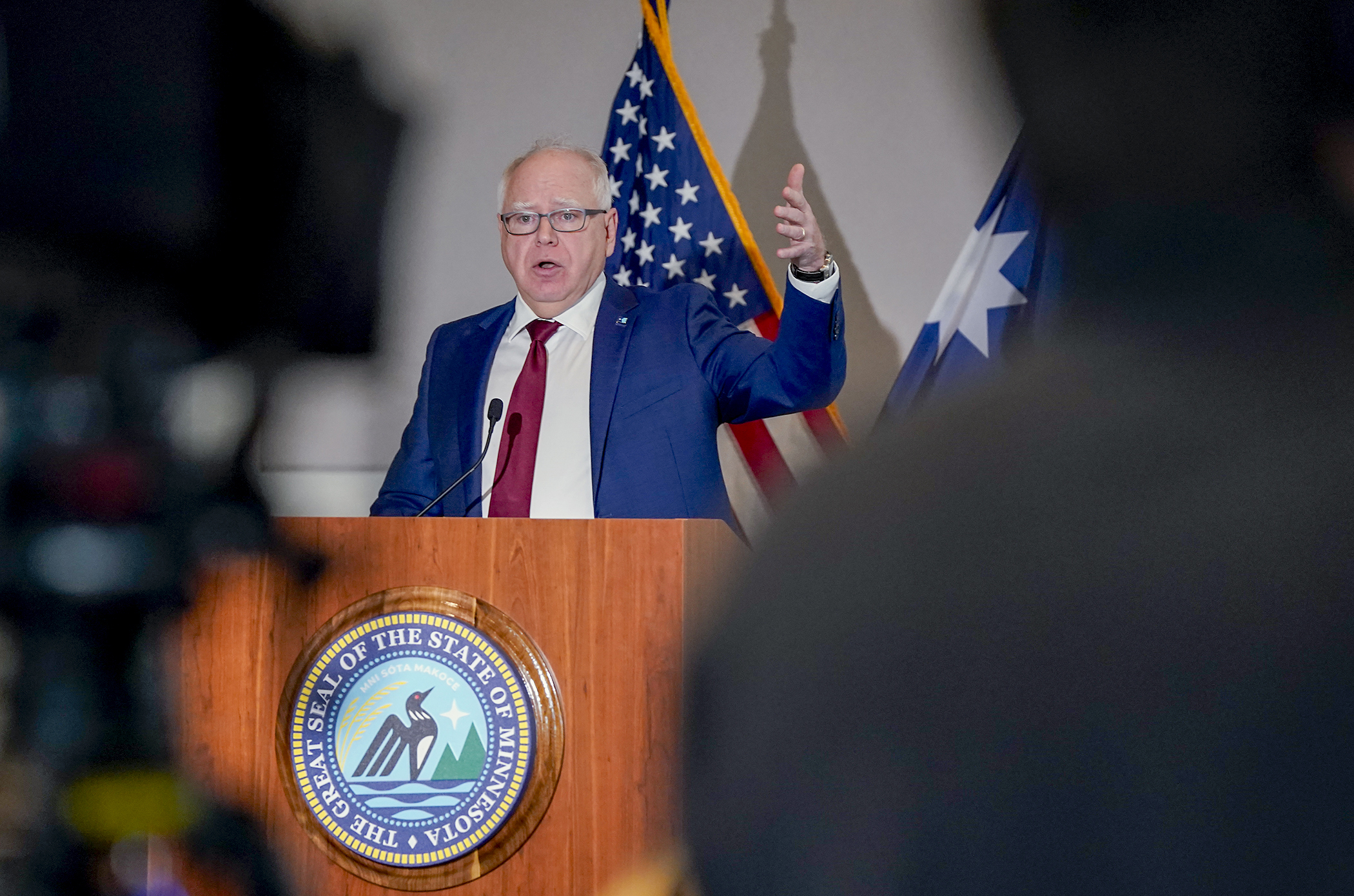 This is an odd-numbered year, and so the Legislature is constitutionally required to craft a budget to fund the state government for the next two fiscal years.
Gov. Tim Walz...
This is an odd-numbered year, and so the Legislature is constitutionally required to craft a budget to fund the state government for the next two fiscal years.
Gov. Tim Walz...